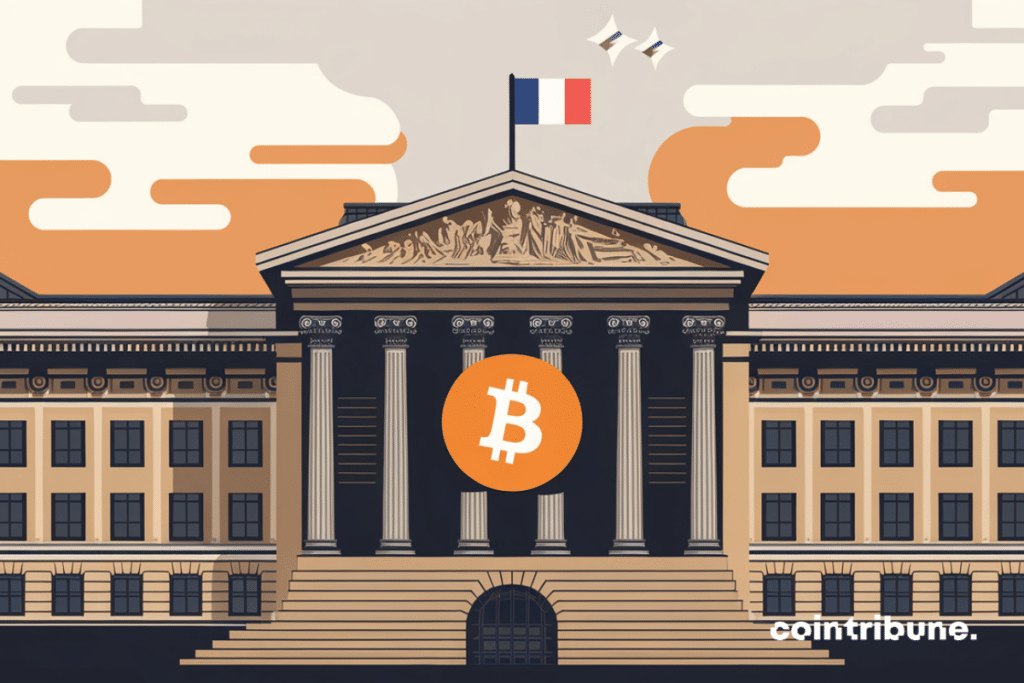💬 François Villeroy de Galhau, gouverneur de la Banque de France, a déclaré ce mercredi à propos du Bitcoin : "C'est un actif risqué. Cela ne veut pas dire qu'on ne peut pas investir en Bitcoin, cela fait partie de la liberté, mais le conseil, c'est de le réserver à des… pic.twitter.com/mlysyxez7y
— Kik Market (@KikMarket) November 14, 2024
A
A
The Bank Of France Endorses Bitcoin
Thu 14 Nov 2024 ▪
6
min read ▪ by
Getting informed
▪
Summarize this article with:
The governor of the Bank of France has lifted the anathema on bitcoin at the microphone of France Inter. A day to be marked in white stone.

The Taste of Risk
François Villeroy de Galhau has watered down his wine, he who asserted two years ago that bitcoin “does not constitute a store of value, but rather a speculative asset akin to the tulip bulb bubble in the Netherlands in the 17th century”.
The governor has now changed his tone, reluctantly stating that everyone is free to invest their savings in it.
“It is a risky asset. That does not mean that one cannot invest in Bitcoin; it is part of freedom. […] Some want to take more risk and that is their right”, he declared.
The governor reminded that “the safest law in finance is that there is an arbitrage between return and risk. Some products yield more, but they are generally more risky”.
Indeed, but let us recall that in finance, this arbitrage is measured via the Sharpe ratio. That is to say, the ratio between return and volatility (risk). Return rate divided by volatility rate.
We want this ratio to be as high as possible. If it is below 1, the return is achieved at the cost of taking too high a risk. If it is above 1, the outperformance is not achieved at the cost of too high a risk.
However, over the last four years, bitcoin shows a Sharpe ratio above 1. Compared to 0.78 for the American stock market and 0.67 for gold. It is even higher than the safest investment there is: US Treasury bonds!
Sharpe ratios over the last four years: Bitcoin: 1.09 / S&P500: 0.78 / Gold: 0.67″
The Trump Effect
The polished statements of the governor are not trivial. They signal the end of the murderous regulation attempts on a G20 scale. The victory of bitcoin is total.
We owe this turnaround to the victory of Donald Trump. The Republican promised to create a strategic reserve of bitcoins during his electoral campaign.
“If I am elected, my government will keep 100% of all the bitcoins we already hold or will acquire [208,000 BTC]”, Mr. Trump had stated during the bitcoin conference in Nashville last July.
He also stated that “it is the current policy of the government that threatens the dollar, not bitcoin”.
That said, the United States knows that the BRICS will not backtrack on the issue of currency reserves. Many nations no longer want to rely entirely on a monetary system controlled by the West.
It is no coincidence that central banks’ gold purchases are reaching record highs. And in this regard, do we hear central bankers say that gold would be a risky asset? No…
But then, why accuse bitcoin of being risky when it is a better version of gold? Just as the internet replaced bookstores, it is hard not to foresee that bitcoin could render gold obsolete.
Bitcoin is a technological breakthrough offering the world a reserve currency existing in absolutely finite quantity. In contrast, more and more gold is extracted every year…
This is a reality that even central banks will have to submit to sooner or later.
Why have we snubbed bitcoin until now?
This distrust is due to the fact that some bitcoiners claim that bitcoin should replace central banks.
Central bankers have thus reacted by uniting against this seemingly existential threat. Nevertheless, the idea that bitcoin could replace the fiat system has faded recently.
After the initial shock, the banking industry quickly abandoned its fears. Ultimately, credit, – that is, the ability to create money ex nihilo and destroy it at the time of repayment – is the cornerstone of a complex society. Bitcoin does not offer an alternative on that front.
Moreover, the thesis that seems to be gaining consensus among bitcoiners is the one articulated by Michael Saylor. For the CEO of Microstrategy, “bitcoin does not need to replace fiat currency to succeed”.
But then, will bitcoin not put an end to the exponential growth of the money supply or to the increasingly steep inflation due to the depletion of energy resources? No.
On the other hand, it allows for distributing the bill of inflation. This inflation affects ordinary people whose savings are primarily made up of euros, but enriches those who own rare assets (luxury real estate, art pieces, stocks, etc.). That is, the assets that only those who are already wealthy can afford.
Bitcoin is revolutionary in that even small savers have access to it. Few people can afford a Haussmann-style apartment. But everyone can buy 50 euros worth of bitcoin.
Ultimately, isn’t it the end of privileges that disturbs the powers that be?
Maximize your Cointribune experience with our "Read to Earn" program! For every article you read, earn points and access exclusive rewards. Sign up now and start earning benefits.
A
A
Bitcoin, geopolitical, economic and energy journalist.
DISCLAIMER
The views, thoughts, and opinions expressed in this article belong solely to the author, and should not be taken as investment advice. Do your own research before taking any investment decisions.